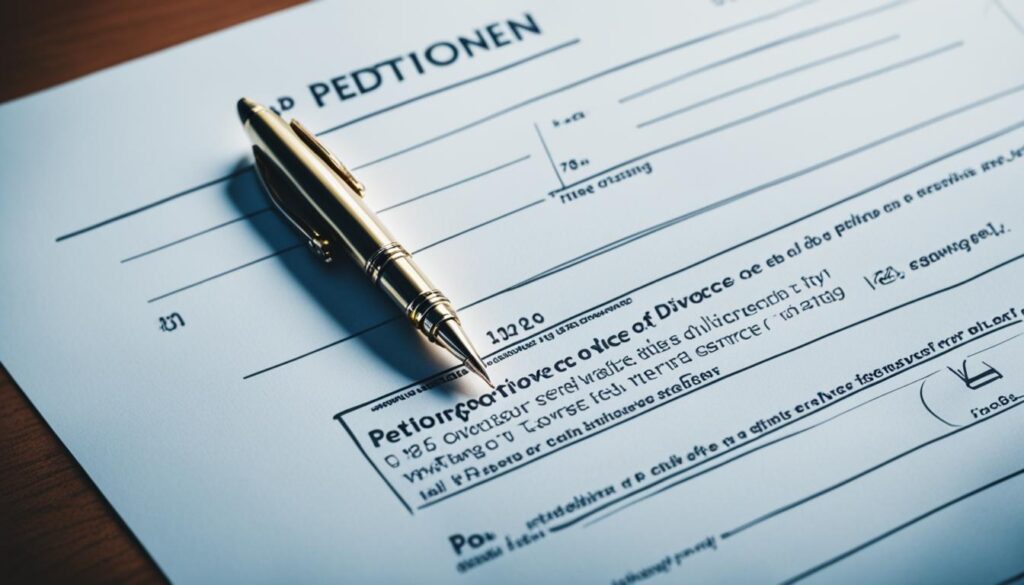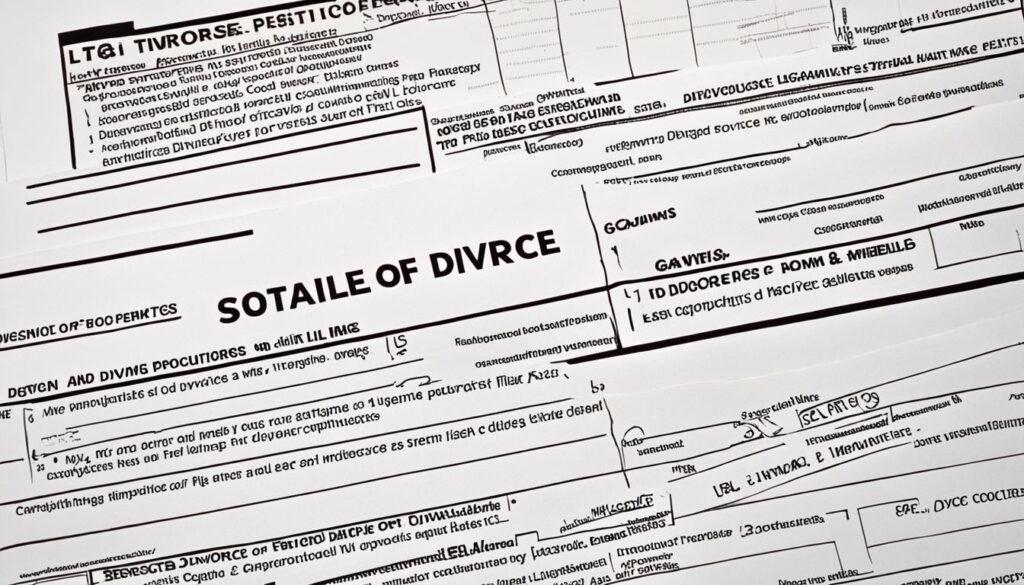Divorcing in Jamaica can pose challenges, particularly for US citizens residing overseas. Familiarizing yourself with the legal steps and factors is essential for a seamless transition to your new life chapter. This segment will present an outline of the divorce procedure in Jamaica, emphasizing key actions and providing crucial advice to assist you.
Key Takeaways:
- Divorcing in Jamaica as a US citizen abroad requires an understanding of the country’s legal process.
- Seeking legal representation is essential to navigate the complexities of the divorce proceedings.
- Emotional support from friends, family, or counseling services can help you cope during this challenging time.
- Specific legal requirements for divorce in Jamaica include being a citizen or resident and satisfying the separation period.
- Financial and mental health implications should be considered when planning for life after divorce.
Grounds for Divorce in Jamaica
Jamaican law recognizes “no-fault” divorce, providing couples the opportunity to dissolve their marriage without having to prove fault. The main ground for no-fault divorce in Jamaica is the “irretrievable breakdown” of the marriage, meaning there is no reasonable chance of reconciliation.
Couples seeking to end their marriage in Jamaica are not required to assign blame or fault to either spouse. This approach to divorce allows for a smoother and more amicable separation process, focusing on the irreparable breakdown of the relationship rather than assigning guilt.
“No-fault” divorce in Jamaica acknowledges that marriages can deteriorate for a variety of reasons, and the emphasis is placed on encouraging a peaceful and equitable dissolution.
This approach can be beneficial for couples who want to part ways amicably or who simply want to move on with their lives without engaging in contentious legal battles. It provides a more compassionate and efficient path to divorce, allowing individuals to prioritize their well-being and focus on rebuilding their lives.
In the next section, we will delve into the specifics of the divorce process in Jamaica, detailing the necessary steps and considerations for those navigating the legal procedures.
No-Fault Divorce vs. Fault-based Divorce
| No-Fault Divorce | Fault-Based Divorce |
|---|---|
| Focuses on irretrievable breakdown of marriage | Requires proving fault or blame |
| Promotes amicable separation | Potential for hostility and disputes |
| Efficient and streamlined process | Lengthy legal battles |
| Allows for a quicker resolution | May require extensive evidence and documentation |
The Divorce Process in Jamaica
The divorce process in Jamaica involves several key steps and legal requirements. Understanding these steps can help individuals navigate the process smoothly. This section will outline the essential stages of divorce in Jamaica, from filing the petition to obtaining the final decree.
Petition for Divorce
The initial step in the divorce process is the filing of a petition for divorce. This document is prepared by one spouse and outlines the grounds for divorce. It must include essential details such as the parties’ names, addresses, and marriage date. The petition serves as the basis for the entire divorce case.
Service of Petition and Acknowledgment of Service
Once the petition is filed, it must be served to the other spouse. This ensures that they are aware of the divorce proceedings. Service of the petition can be done through a process server or by regular mail, depending on the circumstances and court requirements. The other spouse must then acknowledge receipt of the petition.
Declaration of Assets, Negotiation, and Settlement
Both parties are required to declare their assets during the divorce process. This typically involves providing a detailed inventory of their properties, finances, and other relevant information. The declaration of assets is crucial for the negotiation and settlement phase of the divorce. The parties and their legal representatives engage in discussions to reach a fair and mutually agreeable settlement.
Court Proceedings, Decree Nisi, and Decree Absolute
If the parties are unable to reach a settlement through negotiation, the divorce case proceeds to court. During court proceedings, evidence is presented, and the court evaluates the grounds for divorce. If satisfied, the court issues a decree nisi, which is a provisional order indicating that the marriage will be dissolved. After a waiting period, the petitioner can apply for a decree absolute, which officially terminates the marriage.

Considerations During the Divorce Process
When going through a divorce in Jamaica, it is crucial to have the right support system in place. Seeking legal representation and emotional support can make a significant difference in navigating the complexities of the legal process and managing the emotional toll it can take.
Legal Representation:
Obtaining legal representation is vital in ensuring that your rights and interests are protected throughout the divorce proceedings. An experienced divorce attorney can provide valuable guidance and advocacy, helping you understand the legal requirements, preparing necessary documents, and representing your best interests during negotiations or court proceedings.
“Having a knowledgeable lawyer by your side can alleviate the stress of the legal process and ensure that you make well-informed decisions.”
Emotional Support:
Divorce can be emotionally challenging, and having a support network can provide stability and comfort during this difficult time. Seek emotional support from trusted friends, family members, or support groups who can lend a listening ear, offer guidance, and provide a safe space to express your feelings.
“Offering reassurance and compassion, your support system can help you work through your emotions and cope effectively with the changes ahead.”

Legal Requirements for Divorce in Jamaica
In order to obtain a divorce in Jamaica, there are certain legal requirements that must be met. These requirements ensure that the divorce process is fair and in accordance with Jamaican law. Here are the key legal requirements for divorce in Jamaica:
- Citizen or Resident: At least one party involved in the divorce must be a citizen of Jamaica or a resident for a minimum of 12 months. This requirement ensures that the divorce is within the jurisdiction of the Jamaican courts.
- Duration of the Marriage: The marriage must have lasted for a minimum of 2 years. This requirement establishes that the marriage has endured for a substantial period before its dissolution.
- Separation Period: The parties must have been separated for at least 1 year before filing for divorce. This requirement allows for a period of reflection and separation, with the aim of determining if reconciliation is possible.
- Grounds for Divorce: Valid grounds for divorce must exist, such as adultery, cruelty, or desertion. These grounds provide legal justification for the dissolution of the marriage and are essential for obtaining a divorce decree from the court.
Meeting these legal requirements is crucial in initiating and progressing through the divorce process in Jamaica. It is important to consult with a qualified attorney to understand how these requirements apply to your specific situation and to ensure that your divorce proceedings are conducted in compliance with Jamaican law.

Expert Insight:
“The legal requirements for divorce in Jamaica, including citizenship or residency, duration of the marriage, separation period, and grounds for divorce, play a vital role in determining eligibility and ensuring a fair and just legal process. It is essential for individuals seeking a divorce to be well-informed about these requirements and seek professional guidance to navigate the complexities of the Jamaican legal system.”
– Legal Expert, Jamaica
Filing a Divorce Petition
The first step in the divorce process is filing a divorce petition in the Supreme Court of Jamaica. This petition initiates the legal proceedings and provides the necessary information for the court to understand the grounds for divorce and the details of the marriage.
To ensure a smooth process, it is important to include specific information in the divorce petition. This includes:
- The grounds for divorce: Clearly state the reasons for seeking divorce, such as irretrievable breakdown of the marriage.
- The date of the marriage: Specify the exact date when the marriage took place.
Accuracy and completeness are crucial when completing the divorce petition. Providing all the necessary details helps the court make informed decisions and streamline the process.
Additionally, it is important to note that there is a filing fee associated with submitting a divorce petition. The amount may vary, so it is advisable to check with the Supreme Court of Jamaica or consult with legal professionals for the most up-to-date information regarding the filing fee.
“Filing the divorce petition is a significant step towards ending a marriage. It is essential to provide accurate and specific information to ensure a smooth court process.”
| Key Points | Benefits |
|---|---|
| Include specific information in the divorce petition, such as the grounds for divorce and the date of the marriage. | Helps the court understand the reasons for the divorce and the background of the marriage. |
| Ensure accuracy and completeness in filling out the divorce petition. | Prevents delays or rejections in the court process. |
| Be aware of the filing fee associated with submitting a divorce petition. | Helps avoid surprises and ensures proper financial preparation. |
By following the necessary steps and providing the required information, individuals can effectively file a divorce petition in the Supreme Court of Jamaica, setting the legal process in motion.

Serving the Divorce Papers
After filing the divorce petition, the next crucial step is serving the divorce papers to the other spouse. This ensures that they are made aware of the legal proceedings and have the opportunity to respond. There are two common methods of serving divorce papers in Jamaica: through a process server or by regular mail.
A process server is an individual who is authorized to deliver legal documents, including divorce papers, to the person being served. They are trained professionals who understand the importance of following legal procedures and ensuring that the papers are delivered directly to the respondent.
Alternatively, divorce papers can also be served by regular mail. In this case, the documents are sent via postal mail to the respondent’s address. It is important to ensure that the correct address is used and that the mailing is done with proof of delivery or registered mail to confirm receipt.
In both cases, it is crucial to follow the legal requirements for serving divorce papers. The respondent must be served in person unless permission is granted by the court to serve the papers in an alternative manner, such as by mail. This ensures that the respondent has proper notice of the divorce proceedings and has the opportunity to respond.
Responding to the Divorce Petition
Once a divorce petition has been filed, the Respondent has a specific timeframe to respond to the petition. It is essential for the Respondent to be aware of the deadline and take appropriate actions within that timeframe.
If the Respondent fails to respond to the divorce petition, the petitioner can proceed with the divorce without their consent. This means that the divorce can be granted even if the Respondent does not agree to it.
On the other hand, if the Respondent does choose to respond, they have the option to either agree to the divorce or contest it. If both parties agree to the divorce, it can simplify the process and make it less contentious.
However, if the Respondent contests the divorce, it may lead to a more complicated and lengthier process. In such cases, the court will need to evaluate the grounds for divorce and make a decision based on the evidence presented.
Responding to the divorce petition is a crucial step in the divorce process. It is advisable for the Respondent to consult with a lawyer who specializes in family law to understand their rights and options and to ensure that their interests are protected.
“Responding to the divorce petition is a crucial step in the divorce process. It is advisable for the Respondent to consult with a lawyer who specializes in family law to understand their rights and options and to ensure that their interests are protected.”

Timeline for Responding to the Divorce Petition
The specific timeframe for responding to a divorce petition can vary depending on the jurisdiction and the court where the petition was filed. It is important for the Respondent to be aware of the deadline and comply with the required timeline.
In some cases, the Respondent may have a set number of days to file a response after being served with the divorce papers. Failure to respond within the specified timeframe can have consequences and may result in a default judgment.
However, it is essential to note that the timeline for responding to a divorce petition can be influenced by various factors, including the complexity of the case and any extensions granted by the court.
If you are the Respondent in a divorce case, it is crucial to consult with a lawyer who can guide you through the process and ensure that you meet all the necessary deadlines.
Decree Nisi and Decree Absolute
If the Respondent does not respond or contest the divorce, the petitioner can apply for a decree nisi. This provisional order indicates that the marriage will be dissolved. Following a waiting period, the petitioner can then apply for a decree absolute, officially ending the marriage.
The decree nisi serves as a first step towards the final dissolution of the marriage. It confirms that the court is satisfied with the grounds for divorce and recognizes the breakdown of the marital relationship. However, it is important to note that the marriage is not yet formally ended at this stage.
After obtaining a decree nisi, there is a mandatory waiting period before the petitioner can proceed with the application for a decree absolute. This waiting period allows both parties to reflect on the decision and potentially reconsider their positions. Additionally, it provides an opportunity for any outstanding financial or child custody matters to be resolved.
Once the waiting period has elapsed, the petitioner can apply for a decree absolute. This is the final decree of divorce, officially terminating the marriage in the eyes of the law. It is important to complete this step to ensure full legal recognition of the divorce and allow both parties to move forward independently.

Comparison of Decree Nisi and Decree Absolute
| Decree Nisi | Decree Absolute |
|---|---|
| Provisional order | Final order |
| Indicates breakdown of marriage | Formally ends marriage |
| Waiting period follows | Mandatory waiting period completed |
| Allows for reflection and resolution of outstanding matters | Provides full legal recognition of divorce |
Financial Implications of Divorce for Women
Divorce can have significant financial implications for women, leading to economic insecurity, loss of income, increased expenses, and the accumulation of debt. Many women find themselves facing challenges in affording basic necessities, obtaining credit, and finding adequate housing.
One of the main financial implications of divorce is the loss of income. In many cases, women may have relied on their spouses for financial support, and divorce can result in a significant reduction or complete loss of this support. This sudden change in financial circumstances can create uncertainty and difficulties in meeting day-to-day expenses.
Divorce often leads to an increase in expenses as well. Women may find themselves responsible for new costs such as rent or mortgage payments, utility bills, and healthcare expenses. Additionally, there may be legal fees associated with the divorce process itself. All of these expenses can place a significant strain on a woman’s finances.
The accumulation of debt is another common financial implication of divorce. Many women may find themselves with shared debts or may need to rely on credit cards or loans to cover their expenses during and after the divorce process. This can result in a burden of debt that takes years to pay off, further exacerbating economic insecurity.
“Navigating the financial implications of divorce requires careful planning and consideration,” says financial advisor Jane Smith. “It’s important for women to create a realistic budget, prioritize expenses, and seek professional advice to effectively manage their finances and work towards long-term stability.”
When planning for life after divorce, it is crucial for women to take the financial impact into account. Seeking assistance from financial professionals can help develop strategies to address economic challenges and build a solid financial foundation. Proper financial planning can help mitigate the short-term and long-term economic consequences of divorce.
The Importance of Financial Support
“Access to resources and financial support is crucial for women going through divorce,” says divorce attorney Sarah Johnson. “It is important to explore options such as alimony and child support to ensure financial stability and provide a foundation for rebuilding.”
Women should also explore other avenues of financial support, such as government assistance programs, scholarships, or grants that can help alleviate economic insecurity. Additionally, improving financial literacy and gaining new skills through education or training can enhance employment opportunities and increase earning potential.
In conclusion, the financial implications of divorce for women can be significant, leading to economic insecurity, loss of income, increased expenses, and the accumulation of debt. It is crucial for women to plan carefully and seek professional advice to effectively manage their finances and build a stable future.

Mental Health Effects of Divorce on Women
Divorce can have severe and long-lasting effects on women’s mental health. The emotional distress that often accompanies a divorce can be overwhelming, causing anxiety, depression, and a sense of hopelessness. Many women also experience feelings of loneliness as they adjust to a new chapter of their lives.
One of the significant challenges women face during divorce is the loss of identity. The dissolution of a marriage can disrupt a woman’s sense of self and purpose, leading to confusion and a need to rediscover who she is outside of the relationship.
During this difficult time, it is essential for women to recognize the importance of seeking professional help. Therapists and counselors can provide valuable support and guidance as women navigate the emotional challenges of divorce. These professionals can help women develop coping strategies, regain self-confidence, and work through the grief and trauma associated with the end of a significant relationship.
“Divorce can be an incredibly challenging and isolating experience for women. It’s crucial to acknowledge and address the mental health effects that often accompany this life transition. Seeking professional help is not a sign of weakness but a courageous step towards healing and rebuilding.”
– Dr. Sarah Johnson, Clinical Psychologist
By engaging in therapy or counseling, women can gain the tools and support they need to overcome emotional distress, rediscover their sense of self, and rebuild their lives after divorce. These mental health services offer a safe space for women to express their feelings, process their experiences, and develop healthy coping mechanisms.
Professional Help for Mental Health Effects of Divorce
If you are going through a divorce and experiencing mental health challenges, it is crucial to acknowledge your emotional needs and seek professional help. Here are some resources you can explore:
- Contact a licensed therapist or counselor specializing in divorce-related issues.
- Reach out to support groups or community organizations that provide resources for individuals going through divorce.
- Consider online therapy platforms that offer convenient and confidential counseling sessions.
Remember, seeking professional help is a sign of strength and an essential step towards rebuilding your life and mental well-being after divorce.

In the next section, we will explore the legal requirements for obtaining a divorce in Jamaica.
Conclusion
Navigating the divorce process in Jamaica requires a clear understanding of the legal procedures and considerations. Divorce in Jamaica follows a no-fault approach, allowing couples to dissolve their marriage without proving fault. The main ground for divorce is the irretrievable breakdown of the marriage.
It is crucial for individuals going through a divorce in Jamaica to seek legal representation to ensure their rights are protected. A skilled attorney can guide them through the legal process, handle paperwork, and represent their interests in negotiations or court proceedings.
Additionally, emotional support is essential during this challenging time. Divorce can be emotionally and mentally draining. Seeking support from friends, family, or professional counseling services can provide the necessary guidance and stability needed to cope with the emotional rollercoaster.
By approaching the divorce process with empathy and professional guidance, individuals can navigate divorce in Jamaica and move forward with a sense of resolution. Understanding the legal steps, seeking legal representation, and finding emotional support can help make the process smoother and ensure a better outcome.
FAQ
What is a “no-fault” divorce?
A “no-fault” divorce is a type of divorce where couples can dissolve their marriage without proving fault. In Jamaica, the main ground for a no-fault divorce is the “irretrievable breakdown” of the marriage, which means there is no reasonable chance of reconciliation.
What is the process for getting a divorce in Jamaica?
The divorce process in Jamaica starts with one spouse filing a petition for divorce, outlining the grounds for divorce and providing essential details. The petition must then be served to the other spouse, who must acknowledge receipt. Both parties are required to declare their assets and negotiate a settlement. If all else fails, the divorce case proceeds to court, where a decree nisi will be issued if the court is satisfied with the grounds for divorce. After a waiting period, the petitioner can apply for a decree absolute, officially dissolving the marriage.
Why is it important to seek legal advice during a divorce in Jamaica?
It is important for individuals going through a divorce in Jamaica to seek legal advice and representation to navigate the complexities of the legal process. Divorce laws can be complicated, and a lawyer can provide guidance and ensure that your rights are protected throughout the process.
How long do I need to be a citizen or resident of Jamaica to get a divorce?
In order to obtain a divorce in Jamaica, one or both parties must be citizens of Jamaica or residents for at least 12 months.
What are the grounds for divorce in Jamaica?
The grounds for divorce in Jamaica include adultery, cruelty, and desertion. The marriage must have lasted for at least 2 years, and the parties must have been separated for at least 1 year.
What information is required when filing a divorce petition in Jamaica?
When filing a divorce petition in Jamaica, specific information such as the grounds for divorce and the date of the marriage must be included. A filing fee must also be paid.
How can I serve the divorce papers to my spouse in Jamaica?
The divorce papers can be served to your spouse in Jamaica through a process server or by regular mail. However, the respondent is typically required to be served in person unless permission is granted to serve them in an alternative manner.
What happens if my spouse does not respond to the divorce petition?
If your spouse does not respond to the divorce petition, you can proceed with the divorce without their consent. You can apply for a decree nisi, which is a provisional order indicating that the marriage will be dissolved. After a waiting period, you can then apply for a decree absolute, officially ending the marriage.
What are the financial implications of divorce for women?
Divorce can have significant financial implications for women, including loss of income, increased expenses, and long-term economic insecurity. Many women face challenges affording basic necessities, obtaining credit, and finding adequate housing. It is important to consider the financial impact when planning for life after divorce.
What are the mental health effects of divorce on women?
Divorce can have severe and long-lasting effects on women’s mental health. Many women experience emotional distress, loneliness, and a loss of identity. Professional help from therapists or counselors may be necessary to address these issues and move forward in a healthy way.
What are the essential tips for navigating divorce in Barbados as a US resident?
Navigating divorce in Barbados as a US resident can be complex. It’s crucial to understand the legal requirements and seek local legal counsel. Familiarize yourself with Barbadian family law and residency requirements. Stay informed about the process and seek support from professionals, both locally and in the US.










